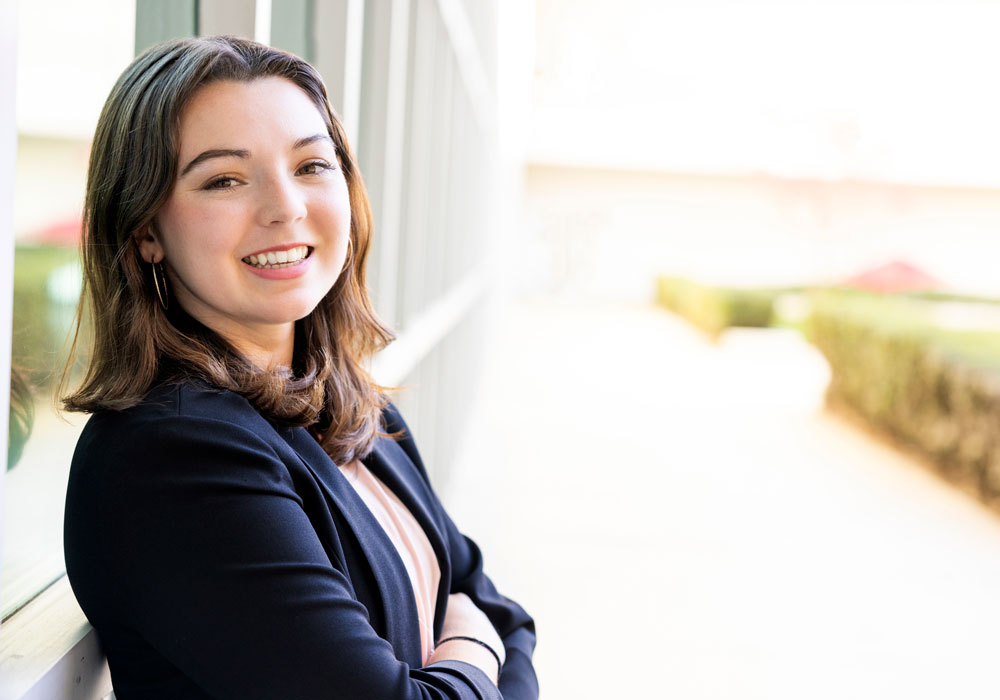Sarah Anne Livingston didn’t just ace her engineering classes. She also engineered her future.
As a woman studying to work in the male-dominated field of mechanical engineering, Livingston learned early that self-doubt would sometimes be an extra variable. But she’s never been one to back down from a problem. It’s what first sparked the Honors College student's interest in the STEM field, eventually opening the door to engineering.
“I actually started as a math major,” she says. “I knew that I liked calculus and physics. But after talking to my high school physics teacher, she made me realize that mechanical engineering is basically just applied math and physics. It was a way that I could take my passion for math and do something with more applications.”
She wasted no time discovering what those applications looked like, racking up a whopping six internships with three different companies while at USC, and she plotted her course with tactical precision.
Case in point: When COVID temporarily forced classes online, she took a break from school to gain work experience at BMW manufacturing in Greer, South Carolina, successfully redirecting her efforts without losing momentum.
“Online classes were just not the best way for me to learn, so that's when I decided that maybe during this period I could I take a break from classes and do a co-op instead, get some work experience, and then come back whenever classes are normal again,” she says.
Variety was the name of the game. She chose internships that could teach her something new about engineering — and about herself.
“I know there are plenty of people like me who might be terrified to come into an internship knowing that sometimes you just look around and you’re the only female in the room. I want to be inspiring to people and help them realize we’re just as capable as anybody else.”
A position with a small engineering consulting firm in Cayce showed her how she could help bring commercial developments to life. Her first stint with International Paper in Georgetown, South Carolina, allowed her to dip her toes into the world of chemical engineering.
And her most challenging position, a co-op at BMW Manufacturing in Greer, South Carolina, taught her how to communicate across all levels of an organization to complete a project.
“That was the first time that I really kind of felt validated in myself,” she says. “I had had validation from other people in the past, but that was the first time that I looked at myself and said, ‘OK, I am capable, and I can do whatever I set my mind to.’”
Choosing USC was a no-brainer given her family’s history. Her parents met at the university, and her grandparents too; her grandfather played for the football team and her grandmother was a cheerleader. But more than that, she was impressed with everything the university had to offer aspiring engineers looking to explore the industry and network with likeminded students.
Take for example Theta Tau, the university’s co-ed engineering fraternity, which gave Livingston the confidence to pursue so many internships. Members host annual outreach activities like Fall into Science and the Living Science Museum, events that introduce children to engineering through fun experiments.
“On top of that, there's also just like day-to-day bonding events — pizza nights, movie nights, paint by numbers, that type of stuff,” she says. “Theta Tau has really given me a great community that I've been able to bond with so much. But it's also a community that has let me show my passion and also spread that passion to others.”
Women make up just 9 percent of the mechanical engineering workforce, according to the U.S. Census Bureau. They account for only 15 percent of engineers worldwide.
Being the only woman can be intimidating. Livingston has experienced it firsthand. People sometimes look at her differently or assume she needs easier assignments than her male counterparts. But instead of deterring her, those experiences motivate her to prove them wrong.
“I know there are plenty of people like me who might be terrified to come into an internship knowing that sometimes you just look around and you’re the only female in the room,” she says. “I want to be inspiring to people and help them realize we’re just as capable as anybody else.”
